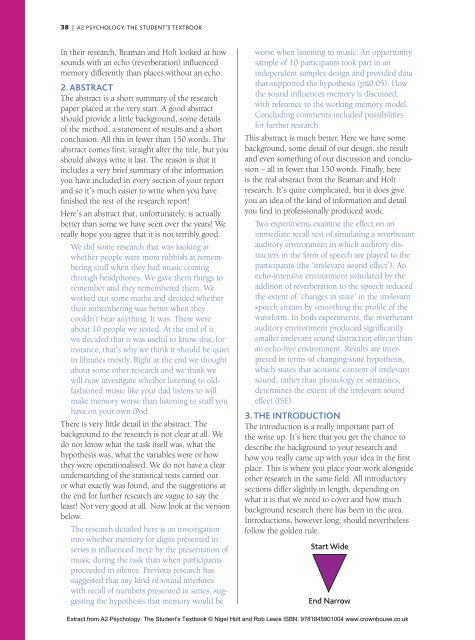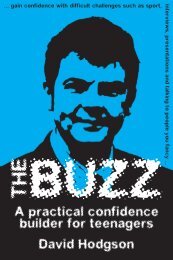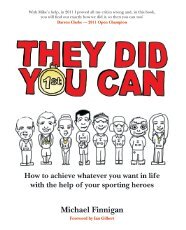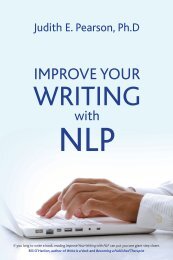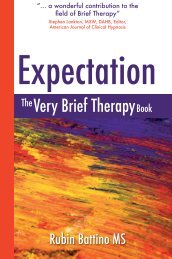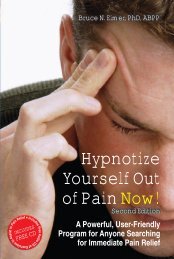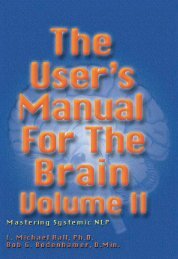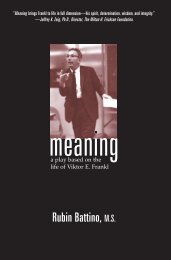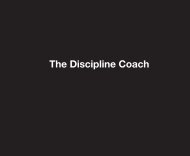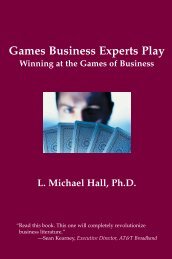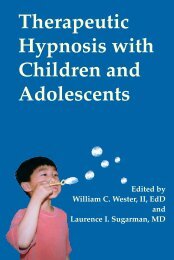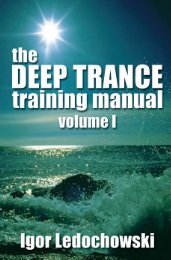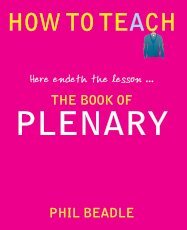Nigel Holt and Rob Lewis - Crown House Publishing.
Nigel Holt and Rob Lewis - Crown House Publishing.
Nigel Holt and Rob Lewis - Crown House Publishing.
Create successful ePaper yourself
Turn your PDF publications into a flip-book with our unique Google optimized e-Paper software.
38 | A2 PSYCHOLOGY: THE STUDENT’S TEXTBOOKIn their research, Beaman <strong>and</strong> <strong>Holt</strong> looked at howsounds with an echo (reverberation) influencedmemory differently than places without an echo.2. AbstractThe abstract is a short summary of the researchpaper placed at the very start. A good abstractshould provide a little background, some detailsof the method, a statement of results <strong>and</strong> a shortconclusion. All this in fewer than 150 words. Theabstract comes first, straight after the title, but youshould always write it last. The reason is that itincludes a very brief summary of the informationyou have included in every section of your report<strong>and</strong> so it’s much easier to write when you havefinished the rest of the research report!Here’s an abstract that, unfortunately, is actuallybetter than some we have seen over the years! Wereally hope you agree that it is not terribly good.We did some research that was looking atwhether people were more rubbish at rememberingstuff when they had music comingthrough headphones. We gave them things toremember <strong>and</strong> they remembered them. Weworked out some maths <strong>and</strong> decided whethertheir remembering was better when theycouldn’t hear anything. It was. There wereabout 10 people we tested. At the end of itwe decided that it was useful to know this, forinstance, that’s why we think it should be quietin libraries mostly. Right at the end we thoughtabout some other research <strong>and</strong> we think wewill now investigate whether listening to oldfashionedmusic like your dad listens to willmake memory worse than listening to stuff youhave on your own iPod.There is very little detail in the abstract. Thebackground to the research is not clear at all. Wedo not know what the task itself was, what thehypothesis was, what the variables were or howthey were operationalised. We do not have a clearunderst<strong>and</strong>ing of the statistical tests carried outor what exactly was found, <strong>and</strong> the suggestions atthe end for further research are vague to say theleast! Not very good at all. Now look at the versionbelow.The research detailed here is an investigationinto whether memory for digits presented inseries is influenced more by the presentation ofmusic during the task than when participantsproceeded in silence. Previous research hassuggested that any kind of sound interfereswith recall of numbers presented in series, suggestingthe hypothesis that memory would beworse when listening to music. An opportunitysample of 10 participants took part in anindependent samples design <strong>and</strong> provided datathat supported the hypothesis (p≤0.05). Howthe sound influences memory is discussed,with reference to the working memory model.Concluding comments included possibilitiesfor further research.This abstract is much better. Here we have somebackground, some detail of our design, the result<strong>and</strong> even something of our discussion <strong>and</strong> conclusion– all in fewer that 150 words. Finally, hereis the real abstract from the Beaman <strong>and</strong> <strong>Holt</strong>research. It’s quite complicated, but it does giveyou an idea of the kind of information <strong>and</strong> detailyou find in professionally produced work.Two experiments examine the effect on animmediate recall test of simulating a reverberantauditory environment in which auditory distractersin the form of speech are played to theparticipants (the ‘irrelevant sound effect’). Anecho-intensive environment simulated by theaddition of reverberation to the speech reducedthe extent of ‘changes in state’ in the irrelevantspeech stream by smoothing the profile of thewaveform. In both experiments, the reverberantauditory environment produced significantlysmaller irrelevant sound distraction effects thanan echo-free environment. Results are interpretedin terms of changing-state hypothesis,which states that acoustic content of irrelevantsound, rather than phonology or semantics,determines the extent of the irrelevant soundeffect (ISE).3. The IntroductionThe introduction is a really important part ofthe write up. It’s here that you get the chance todescribe the background to your research <strong>and</strong>how you really came up with your idea in the firstplace. This is where you place your work alongsideother research in the same field. All introductorysections differ slightly in length, depending onwhat it is that we need to cover <strong>and</strong> how muchbackground research there has been in the area.Introductions, however long, should neverthelessfollow the golden rule.Start WideEnd NarrowExtract from A2 Psychology: The Student’s Textbook © <strong>Nigel</strong> <strong>Holt</strong> <strong>and</strong> <strong>Rob</strong> <strong>Lewis</strong> ISBN: 9781845901004 www.crownhouse.co.uk


